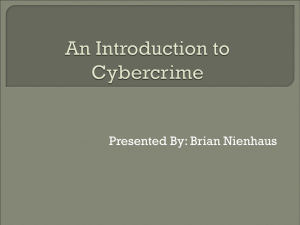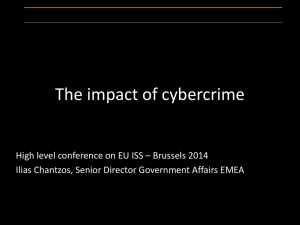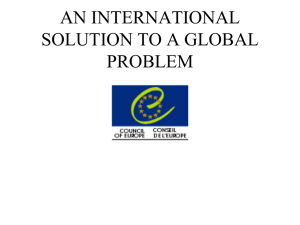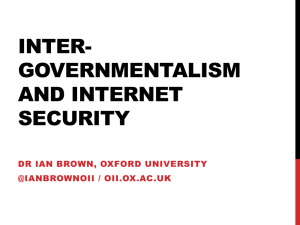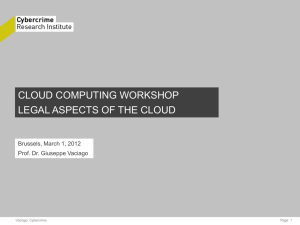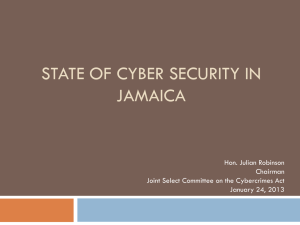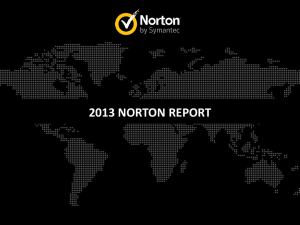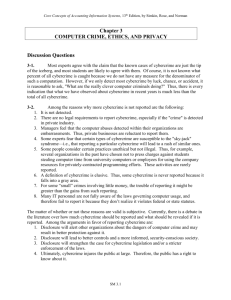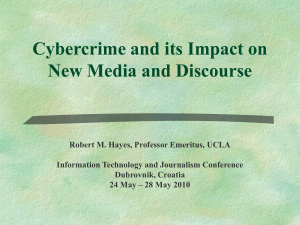Document
advertisement
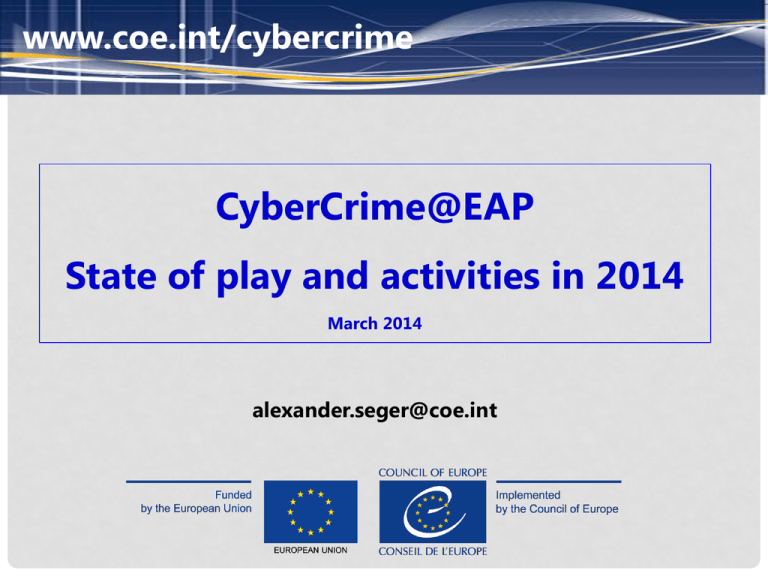
www.coe.int/cybercrime CyberCrime@EAP State of play and activities in 2014 March 2014 alexander.seger@coe.int Cybercrime: the approach of the Council of Europe 1 Setting & making use of common standards 2 Follow up and assessments: Cybercrime Convention Committee (T-CY) Budapest Convention on Cybercrime “Protecting you and your rights in cyberspace” 3 Capacity building: Technical cooperation programmes About CyberCrime@EAP Objective: Duration: To strengthen the capacities of criminal justice authorities of Eastern Partnership countries March 2011 – December 2014 to cooperate effectively against cybercrime in line with European and international instruments and practices Budget: EUR 894,000 (increase from EUR 724,000) Project logic 1 Analysis of situation 2 Activities on Legislation Safeguards Specialised units LEA training Judicial training LEA/ISP cooperation and PP info sharing Financial investigations International cooperation 3 Assessment of progress 4 Engagement of decisionmakers / strategic priorities Expected result 1: Eastern Partnership countries have taken steps towards defining strategic priorities regarding cybercrime Situation report Strategic priorities seminar (Georgia, June 2012) Participation in CyberCrime@IPA conference (Feb 2013) Assessments : Visits to Armenia, Belarus, Georgia, Moldova, Ukraine (April 2013) The report has been agreed upon in Kyiv, 3031 October 2013 Declaration on strategic priorities (conference, Kyiv, 30-31 October 2013) CyberCrime@EAP: Adoption of strategic priorities (Kyiv, 30-31 October 2013) 1. Cybercrime policies and engagement 2. Legislation 3. Specialised units 4. Law enforcement training 5. Judicial training 6. Financial investigations 7. LEA/ISP cooperation 8. International cooperation Joint Declaration on Eastern Partnership Justice and Home Affairs adopted by Ministers responsible for justice and home affairs of European Union Member States and States participating in the Eastern Partnership (Luxembourg, 8 October 2013) stresses, inter alia, the importance of enhancing cooperation against cybercrime through effective application of the standards of the Budapest Convention on Cybercrime Expected result 2: Eastern Partnership countries are provided with the tools for action against cybercrime Legislation: Analysis of situation Specific support to Armenia Specific support to Azerbaijan Article 15 – conditions and safeguards Workshops Study adopted and published October 2013 Expected result 2: Eastern Partnership countries are provided with the tools for action against cybercrime Advice on specialised units: Georgia Moldova Armenia Regional events Good practice study Expected result 2: Eastern Partnership countries are provided with the tools for action against cybercrime Training: Judicial training concepts Judicial training materials Law enforcement training concepts 1st responders course Electronic evidence guide Expected result 2: Eastern Partnership countries are provided with the tools for action against cybercrime Good practices/ experience exchange/enhanced knowledge/proposals on: Financial investigations LEA/ISP cooperation Private/public information sharing Expected result 3: Eastern Partnership countries participate more actively in international cybercrime efforts Cybercrime Convention Committee (T-CY), December 2013 24/7 points of contact Budapest Convention G8 network of contact points Octopus Conference, December 2013 Internet Governance Forum Cooperation with South-eastern Europe (CyberCrime@IPA region) Participation in international law enforcement operations GLACY Project title: Global Action on Cybercrime (GLACY) Duration: 36 months (Nov 2013 – Oct 2016) Budget: EUR 3.35 million Funding: European Union (Instrument for Stability, IfS) and Council of Europe Geo scope: Countries prepared to implement the Budapest Convention CyberCrime@EAP: Activities 2014 Judicial training on cybercrime and electronic evidence Regional workshop on setting up a working group (Bucharest, end-May 2014) Analysis of judicial training systems Adaptation of training materials Desk study on judicial training and materials (June – October 2014) Regional workshop to Present adapted training materials Agree on steps to be taken to mainstream courses into curricula CyberCrime@EAP: Activities 2014 Procedural law reform Advice (including country visits) on procedural law reform related to cybercrime and electronic evidence in individual countries CyberCrime@EAP: Activities 2014 in cooperation with GLACY Workshop on international cooperation (24/7 contact points and MLA authorities), Dakar, Senegal, 24-27 March 2014 Workshop on law enforcement training strategies and access to training materials (EUROPOL, The Hague, 12-15 May 2014) Cybercrime capacity building 2014 - 2020 1. Ensure follow up/implementation of strategic priorities 2. Strengthening of legislation: procedural law, safeguards, data protection, child protection 3. Mainstreaming of judicial training on cybercrime and electronic evidence 4. Delivery of LEA training 5. LEA/ISP cooperation and private/public information sharing 6. Efficiency of international cooperation 7. Cybercrime reporting
